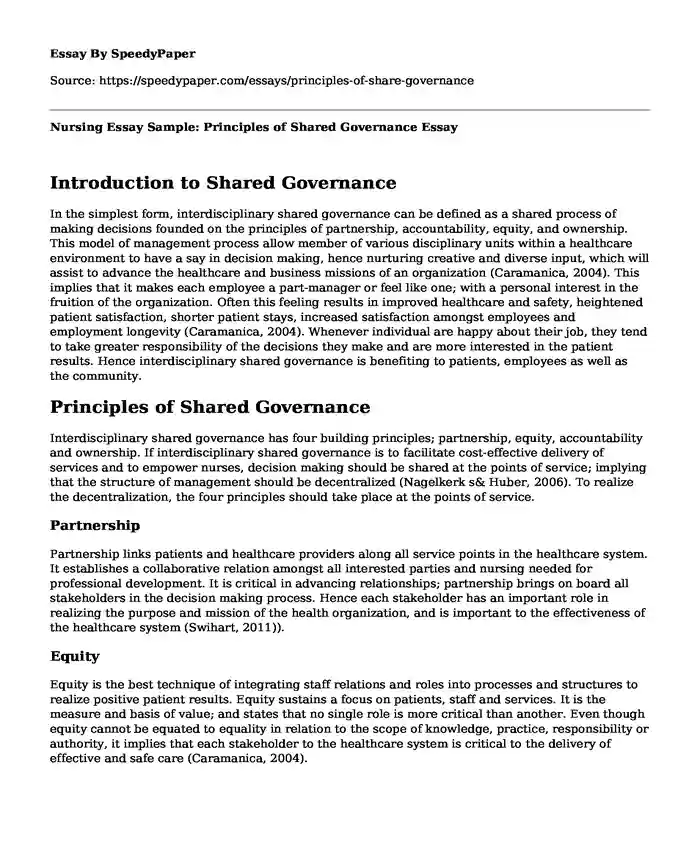
| Type of paper: | Essay |
| Categories: | Health and Social Care Nursing management Nursing leadership |
| Pages: | 3 |
| Wordcount: | 658 words |
Introduction to Shared Governance
In the simplest form, interdisciplinary shared governance can be defined as a shared process of making decisions founded on the principles of partnership, accountability, equity, and ownership. This model of management process allow member of various disciplinary units within a healthcare environment to have a say in decision making, hence nurturing creative and diverse input, which will assist to advance the healthcare and business missions of an organization (Caramanica, 2004). This implies that it makes each employee a part-manager or feel like one; with a personal interest in the fruition of the organization. Often this feeling results in improved healthcare and safety, heightened patient satisfaction, shorter patient stays, increased satisfaction amongst employees and employment longevity (Caramanica, 2004). Whenever individual are happy about their job, they tend to take greater responsibility of the decisions they make and are more interested in the patient results. Hence interdisciplinary shared governance is benefiting to patients, employees as well as the community.
Principles of Shared Governance
Interdisciplinary shared governance has four building principles; partnership, equity, accountability and ownership. If interdisciplinary shared governance is to facilitate cost-effective delivery of services and to empower nurses, decision making should be shared at the points of service; implying that the structure of management should be decentralized (Nagelkerk s& Huber, 2006). To realize the decentralization, the four principles should take place at the points of service.
Partnership
Partnership links patients and healthcare providers along all service points in the healthcare system. It establishes a collaborative relation amongst all interested parties and nursing needed for professional development. It is critical in advancing relationships; partnership brings on board all stakeholders in the decision making process. Hence each stakeholder has an important role in realizing the purpose and mission of the health organization, and is important to the effectiveness of the healthcare system (Swihart, 2011)).
Equity
Equity is the best technique of integrating staff relations and roles into processes and structures to realize positive patient results. Equity sustains a focus on patients, staff and services. It is the measure and basis of value; and states that no single role is more critical than another. Even though equity cannot be equated to equality in relation to the scope of knowledge, practice, responsibility or authority, it implies that each stakeholder to the healthcare system is critical to the delivery of effective and safe care (Caramanica, 2004).
Accountability
Accountability is the willingness of individuals to invest in the process of making decisions and to express ownership in the decisions. It is the primary element of interdisciplinary shared governance. As a matter of fact, it is frequently interchanged with responsibility and facilitates the assessment of role performance (Swihart, 2011). Accountability also facilitates partnership and is guaranteed as employee produce positive results.
Ownership
Ownership refers to the acknowledgement and acceptance of the significance of the work of every individual and of the fact that the success of an organization is determined by how well individual employees perform their duties. To all stakeholders to take part in the care delivery process, ownership articulates the place where the work is done and the person doing the work. It requires all members of staff to commit to the contribution of something; to on their contribution, and to take part in developing tenacities for the work (Swihart, 2011).
Conclusion
In conclusion, interdisciplinary shared governance is an important facet of service delivery in the healthcare setting. In fact it has been identified as a primary indicator of excellence in the care delivery. Interdisciplinary shared governance processes or activities might include mutual staffing decisions, participatory scheduling and common unit responsibilities with the aim of realizing the best patient care results.
References
Caramanica, L. (2004). Shared governance: Hartford hospitals experience. Online Journal of Issues in Nursing, 9(1), 112-119.
Nagelkerk, J. M., & Huber, D. (2006). Study guide for Leadership and nursing care management, third edition. St. Louis: Saunders Elsevier.
Swihart, D. (2011). Shared governance: A practical approach to transform professional nursing practice. Danvers, MA: HCPro.
Cite this page
Nursing Essay Sample: Principles of Shared Governance. (2017, Sep 09). Retrieved from https://speedypaper.com/essays/principles-of-share-governance
Request Removal
If you are the original author of this essay and no longer wish to have it published on the SpeedyPaper website, please click below to request its removal:
- Theory of Knowledge, Free Essay in Philosophy
- Art Essay Example: Cultural and Political Contexts of Asian-American Plays
- Free Essay on Strategic Management for a Start-Up Firm
- Essay Example on Why Abortion Should Be Legal
- XM and Sirius Radio, Business Essay Example
- Free Essay for You: Saje Natural Wellness and Its Environmental Impact
- Paper Example. Auerbach Enterprises
Popular categories




